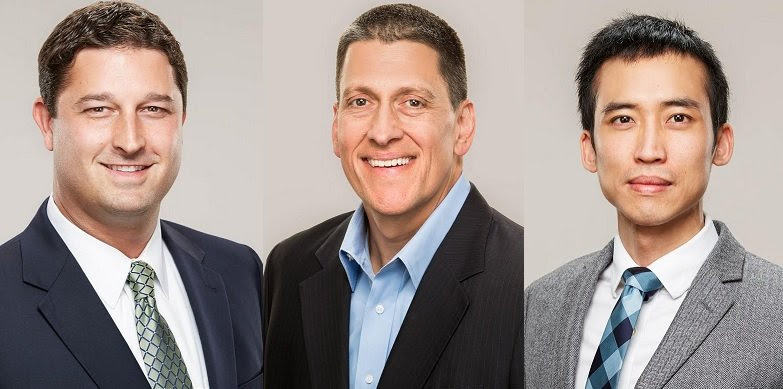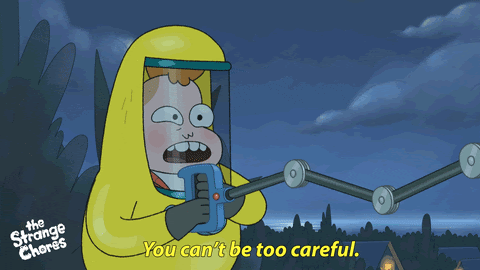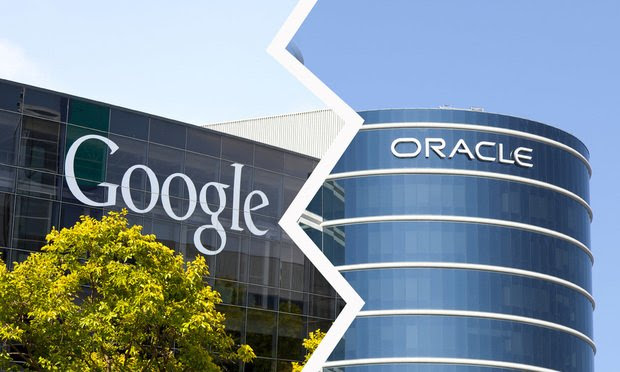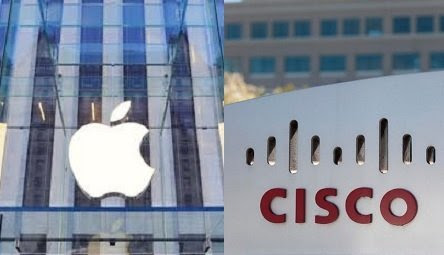Skilled in the Art: Trial? No Trial? Ericsson and TCL in Bizarro Patent World + The Coronavirus Ate My Fee Motion
Finnegan wipes out $110 million patent infringement judgment against TCL Communication.
April 14, 2020 at 12:13 PM
9 minute read
Welcome to Skilled in the Art. I'm Law.com IP reporter Scott Graham. Here's what's cracking today:
• Finnegan wipes out $110 million patent infringement judgment against TCL Communication.
• PersonalWeb wants a coronavirus break in the massive fee litigation it's facing.
• Google v. Oracle copyright showdown at the Supreme Court appears to be on hold till the fall.
• Lodestar, shmodestar, says Cisco Systems in its bid for $3.8 million in fees against Straight Path IP Group.
As always, you can email me your thoughts and follow me on Twitter.
 (L-R) Finnegan attorneys David Mroz, Lionel Lavenue and Michael Liu Su.
(L-R) Finnegan attorneys David Mroz, Lionel Lavenue and Michael Liu Su.
Have a Trial. Trial Isn't Necessary.
Ericsson and TCL Communication seem to be inhabiting Superman's Bizarro World when it comes to their patent disputes. Last fall the U.S. Court of Appeals for the Federal Circuit wiped out a Central District of California FRAND adjudication of Ericsson's standard-essential patents, saying Ericsson was entitled to a jury trial. The wireless IP giant is now back in Santa Ana, gunning for tens if not hundreds of millions in damages and royalties. Conversely, Ericsson won a $110 million judgment on its non-SEP patents in a jury trial in the Eastern District of Texas. But on Monday, the Federal Circuit threw out that judgment, saying the trial was irrelevant because U.S. Magistrate Judge Roy Payne should have granted summary judgment to TCL on Section 101 grounds.
"Me judgment am vacated," the Federal Circuit's Chief Judge No. 1 wrote for a divided panel.
No, that's not how it was worded. I'm joking.
The real Chief Judge Sharon Prost did vacate the judgment, with the key to her decision being that TCL was not required to make a Rule 50 motion to Payne after trial to preserve the issue of patent eligibility on appeal.
"Once the district court held that the '510 patent was not directed to an abstract idea at step one, there was no set of facts that TCL could have adduced at trial to change that conclusion," Prost wrote. "As a result, the district court effectively entered judgment of eligibility to Ericsson."
On the merits, Ericsson's claimed "system for controlling access to a platform" was too abstract, Prost wrote, even if it might have been intended for complex computer systems. The same kinds of claims have been found ineligible when they involve libraries loaning to card-holding members, office buildings allowing certain employees entrance to certain floors,, or banks making loan decisions, Prost wrote. "In each of these circumstances, as in the claims at issue, a request is made for access to a resource, that request is received and evaluated, and then the request is either granted or not," she wrote.
Judge Raymond Chen concurred.
Dissenting Judge Pauline Newman said she agreed that the idea of controlling access to library books is an ancient idea, "but this does not convert every method of controlling access, no matter how novel and unobvious and technologically complex, into an ineligible abstraction."
Moreover, TCL waived the issue, Newman argued. "There was no final judgment on this issue—and no record, no evidence, no witnesses, no expertise, no argument, and no district court decision," she wrote.
Fair or not, Bizarro or not, the decision is a huge win for a Finnegan, Henderson, Farabow, Garrett & Dunner team led by partner Lionel Lavenue, who argued the appeal, partner David Mroz and associate Michael Liu Su.
McKool Smith, which recorded December's big win for Ericsson, came out on the short end this time.

NPE: Put Fee Motions on Hold During Pandemic
PersonalWeb Technologies just wants to help.
The non-practicing entity thinks it would be a good idea to deny Amazon.com's motion for $6.1 million in attorneys fees without prejudice while the Federal Circuit reviews two substantive rulings from U.S. District Judge Beth Labson Freeman that ended PersonalWeb's case.
"PersonalWeb is particularly mindful, now more than ever, of the Court's potentially reduced resources and increased demand for its services which further necessitates the requested relief," PersonalWeb stated in a joint statement Friday signed by Stubbs, Alderton & Markiles partner Michael Sherman.
I was going to say that must be our first COVID-19-based opposition to a Section 285 motion. But there's been at least one other: Amazon's attorneys point out in the same filing that PersonalWeb made a similar argument a few weeks ago in another San Jose case. That one has already been turned down by U.S. District Judge Edward Davila.
The case before Freeman, In re PersonalWeb Technologies, is the big enchilada. PersonalWeb sued 85 customers of Amazon's S3 storage service and CloudFront content delivery network, accusing them all of them of infringing PersonalWeb's unique-identifier patents through use of the Amazon services. The cases were rolled into an MDL along with Amazon's DJ action.
PersonalWeb's problem was that it had already sued Amazon and DropBox over S3 in the Eastern District of Texas. So the S3 claims were precluded, and Freeman eventually granted summary judgment on the CloudFront claims as well.
That led to Amazon's March 20 fee motion. Fenwick & West partner Dave Hadden accused PersonalWeb of trying to extract nuisance-value settlements from scores of innocent companies. "PersonalWeb is a recidivist-patent abuser with a long history of making big bets on weak cases," he wrote. "Its conduct in this case is exactly the type that the federal courts should deter."
PersonalWeb originally stipulated to a briefing schedule that would end this spring. After Amazon filed its motion, PersonalWeb argued that the similarity between the fee issues and the substantive issues on appeal, combined with the COVID-induced need to conserve judicial resources, counseled putting the motion on ice for now.
That had Hadden crying foul. "Amazon is open to handling the motion, particularly the hearing, in a way the Court deems appropriate in light of the pandemic," he wrote. "But a request to defer a ruling by years is an opportunistic use of the present difficult circumstances."
PersonalWeb, represented by different counsel in a case against EMC, made a similar pitch to Davila on March 23. He turned them down Thursday, saying the great weight of authority favors deciding a fee motion promptly. "Plaintiffs do not contend how they will be irreparably harmed absent a stay," Davila wrote. "Instead, Plaintiffs focus on how the Court will be inconvenienced and harmed absent a stay."

Google v. Oracle on Hold for Now
The Supreme Court showdown between Oracle and Google appears to be on hold until at least October. That's the conclusion folks are drawing after the high court published its list of cases for telephonic argument next month and the big copyright showdown wasn't on it.
Oracle v. Google (or Google v. Oracle at the Supreme Court) has been tried twice to San Francisco juries and appealed twice to the Federal Circuit. The case turns 10 years old in August. It had originally been set for argument at the Supreme Court in April.

Cisco: Don't Penalize Us for Flat Fees
The special master reviewing Cisco Systems' and Apple's request for about $6.5 million in attorneys fees against Straight Path IP Group has had his say. And now the tech giants have had theirs.
Cisco filed 29 pages of objections last month after special master Matthew Borden recommended its $3.8 million request be cut in half because it failed to submit appropriately detailed billing information.
Cisco had flat fee arrangements with both Desmarais and Baker Botts during the case, and is asking U.S. District Judge William Alsup to rule that the traditional lodestar analysis should no longer be required when awarding fees under Section 285.
In recent years, "sophisticated clients, including frequent patent litigants such as Cisco, have sought alternative fee arrangements, eschewing the billable hour model," Cisco wrote in a March 25 filing to Alsup that is signed by Desmarais partner Justin Wilcox. Section 285 "requires only that the award be 'reasonable.' Nowhere does Section 285 require an attorney to bill by the hour to recover fees."
The problem for Cisco is that Alsup explicitly ordered the tech companies to submit a project-by-project breakdown, including "the date, hours expended [and] attorney time" for each. Borden, a BraunHagey & Borden partner who's a former law clerk of Alsup's, found that Desmarais could have used emails, calendar entries and its document management system to reconstruct time records, but chose not to do so.
Wilcox says in his filing that he provided that data, but that Borden "may have misunderstood the submission, and seems to have overlooked the data submitted."
Straight Path argues that Cisco should get nothing due to its recalcitrance. Supreme Court precedent requires lodestar evidence to support a "reasonable attorneys fee" award, Russ, August & Kabat partner Brian Ledahl argues to Alsup.
Apple, meanwhile, submitted only 2 ½ pages of objections, and might as well have painted a Cheshire Cat grin across them. Borden recommended Apple be awarded $2.3 million of its requested $2.7 million, plus an additional $300,000 if Alsup is willing to excuse a belated request for appellate fees. It appears Apple isn't going to bother with the appellate fees.
Perhaps recognizing the precarious ground its standing on, Cisco says that despite all of its objections, its endorsing Borden's bottom line. "Although Cisco respectfully disagrees with certain aspects of the Special Master's findings," Wilcox writes, "Cisco acknowledges the work performed by the Special Master and respectfully asks this Court to adopt his recommended award."
Alsup has set a May 7 hearing date.
That's all from Skilled in the Art today. I'll see you all again on Friday.
This content has been archived. It is available through our partners, LexisNexis® and Bloomberg Law.
To view this content, please continue to their sites.
Not a Lexis Subscriber?
Subscribe Now
Not a Bloomberg Law Subscriber?
Subscribe Now
NOT FOR REPRINT
© 2025 ALM Global, LLC, All Rights Reserved. Request academic re-use from www.copyright.com. All other uses, submit a request to [email protected]. For more information visit Asset & Logo Licensing.
You Might Like
View All
Skilled in the Art With Scott Graham: I'm So Glad We Had This Time Together

Design Patent Appeal Splinters Federal Circuit Panel + Susman Scores $163M Jury Verdict + Finnegan Protects Under Armour's House
Law Firms Mentioned
Trending Stories
- 1South Florida Attorney Charged With Aggravated Battery After Incident in Prime Rib Line
- 2'A Death Sentence for TikTok'?: Litigators and Experts Weigh Impact of Potential Ban on Creators and Data Privacy
- 3Bribery Case Against Former Lt. Gov. Brian Benjamin Is Dropped
- 4‘Extremely Disturbing’: AI Firms Face Class Action by ‘Taskers’ Exposed to Traumatic Content
- 5State Appeals Court Revives BraunHagey Lawsuit Alleging $4.2M Unlawful Wire to China
Who Got The Work
J. Brugh Lower of Gibbons has entered an appearance for industrial equipment supplier Devco Corporation in a pending trademark infringement lawsuit. The suit, accusing the defendant of selling knock-off Graco products, was filed Dec. 18 in New Jersey District Court by Rivkin Radler on behalf of Graco Inc. and Graco Minnesota. The case, assigned to U.S. District Judge Zahid N. Quraishi, is 3:24-cv-11294, Graco Inc. et al v. Devco Corporation.
Who Got The Work
Rebecca Maller-Stein and Kent A. Yalowitz of Arnold & Porter Kaye Scholer have entered their appearances for Hanaco Venture Capital and its executives, Lior Prosor and David Frankel, in a pending securities lawsuit. The action, filed on Dec. 24 in New York Southern District Court by Zell, Aron & Co. on behalf of Goldeneye Advisors, accuses the defendants of negligently and fraudulently managing the plaintiff's $1 million investment. The case, assigned to U.S. District Judge Vernon S. Broderick, is 1:24-cv-09918, Goldeneye Advisors, LLC v. Hanaco Venture Capital, Ltd. et al.
Who Got The Work
Attorneys from A&O Shearman has stepped in as defense counsel for Toronto-Dominion Bank and other defendants in a pending securities class action. The suit, filed Dec. 11 in New York Southern District Court by Bleichmar Fonti & Auld, accuses the defendants of concealing the bank's 'pervasive' deficiencies in regards to its compliance with the Bank Secrecy Act and the quality of its anti-money laundering controls. The case, assigned to U.S. District Judge Arun Subramanian, is 1:24-cv-09445, Gonzalez v. The Toronto-Dominion Bank et al.
Who Got The Work
Crown Castle International, a Pennsylvania company providing shared communications infrastructure, has turned to Luke D. Wolf of Gordon Rees Scully Mansukhani to fend off a pending breach-of-contract lawsuit. The court action, filed Nov. 25 in Michigan Eastern District Court by Hooper Hathaway PC on behalf of The Town Residences LLC, accuses Crown Castle of failing to transfer approximately $30,000 in utility payments from T-Mobile in breach of a roof-top lease and assignment agreement. The case, assigned to U.S. District Judge Susan K. Declercq, is 2:24-cv-13131, The Town Residences LLC v. T-Mobile US, Inc. et al.
Who Got The Work
Wilfred P. Coronato and Daniel M. Schwartz of McCarter & English have stepped in as defense counsel to Electrolux Home Products Inc. in a pending product liability lawsuit. The court action, filed Nov. 26 in New York Eastern District Court by Poulos Lopiccolo PC and Nagel Rice LLP on behalf of David Stern, alleges that the defendant's refrigerators’ drawers and shelving repeatedly break and fall apart within months after purchase. The case, assigned to U.S. District Judge Joan M. Azrack, is 2:24-cv-08204, Stern v. Electrolux Home Products, Inc.
Featured Firms
Law Offices of Gary Martin Hays & Associates, P.C.
(470) 294-1674
Law Offices of Mark E. Salomone
(857) 444-6468
Smith & Hassler
(713) 739-1250










